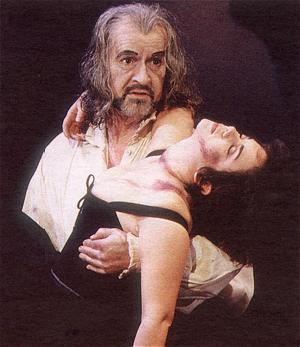Glorious addition to the year of
Lear.
|
This has been the year of Lear. It began with
Kathryn Hunter pottering pluckily but unrewardingly among the foothills of this
actor's Everest, the first - and I trust the last - British woman ever to play
the tormented king.
Then came Ian Holm's triumph at the National.
It was a performance, and a production, that insisted that this was a domestic
as well as a cosmic tragedy. Though Holm sometimes lacked kingly grandeur, he
searched deep into the magnificent heart of the play. Those who saw him will
never forget when he stripped naked in the storm, or his inconsolable grief at
the end.
Alan Howard now has the daunting task of
following one of the most acclaimed Lears in recent memory, and at first I
feared he was going to blow it.
Howard has an unusual problem as an actor - his
technique and his voice are almost too good. He can pilot his way through yards
of blank verse with extraordinary skill and clarity, and he can range,
apparently effortlessly, from hooting musicality to great growls of anger and
despair. The effect, however, is outmoded. Howard puts one in mind of the
old-style actor-laddie, giving a demonstration of the voice beautiful, and
these days we value racked sincerity above polished expertise. |
 |
Peter Hall's production is initially off-putting. A
cavalier by temperament, he is a roundhead when it comes to Shakespeare,
insisting on exemplary verse-speaking and a complete absence of gimmickry and
spin. Watching the opening scene, with the characters dressed in formal
Jacobean costume, all velvet, silk and immaculate ruffs, one gets the worrying
impression that this is going to be a bland example of 'masterpiece theatre',
scrupulously traditional and dull.
It doesn't turn out like that. For a start it is a
real pleasure to hear the verse spoken so well. This is also a production that
combines an exceptionally fleet pace (Hall uses the shorter, Folio version)
with exemplary clarity. I have never been more aware of the play's
architecture, both in the grand design and the detail, the intricate patterning
not just of scenes but recurring vocal motifs such as 'nothing', which
punctuates the whole play like like a terrifying void.
Hall has gathered a superb company around him, and
the ensemble playing at the Old Vic grows ever more impressive. There are
particularly rich rewards in seeing some of the same actors from Godot, because
there are unmistakeable echoes between the two plays. It's impossible to watch
Denis Quilley's deeply moving, humane performance as the blinded Gloucester,
for instance, without remembering him as the blind Pozzo.
But the comparison reminds us of just how remarkable
Shakespeare is. Beckett offers the most facile pessimism. Lear, while examining
mankind at its most lost and barbarous, salvages something from the wreck.
There may be no answer to Lear's agonising question about whether there is 'any
cause in nature that makes these hard hearts', but one also takes from the play
the memory of Cordelia's love, Lear's redemption and the eventual triumph of
the good.
Howard grows in stature and accomplishment as the
evening wears on. In the thrillingly staged storm sequence he beautifully shows
self-pity turning into human sympathy, as well as poignantly capturing the
terror of madness. The scene on Dover beach, with its quicksilver mood-swings,
is virtuosic, his recognition of Gloucester deeply affecting, while the broken
simplicity of his reconciliation with Cordelia (a performance of glowing
gentleness from Victoria Hamilton) reduced me to tears. If this is finally a
very good rather than a great Lear, it's because Howard never quite suggests,
as do Holm and Robert Stephens, that it has been torn from his very
soul.
Greg Hicks is a superb Edgar, wild as poor Tom, warm
and noble as himself, and his emotional journey seems almost as terrible as
Lear's. Andrew Woodall misses the sexy glamour of evil as Edmund, but Jenny
Quayle has it in spades as a horribly smiling, disconcerting Regan. David
Yelland makes a wonderfully sympathetic Kent and Alan Dobie is a touchingly old
and weary Fool.
This is an unashamedly old-fashioned production, but
there is no mistaking its sturdy strength and integrity.
Charles Spencer.
The Daily Telegraph. 26.9.97.
